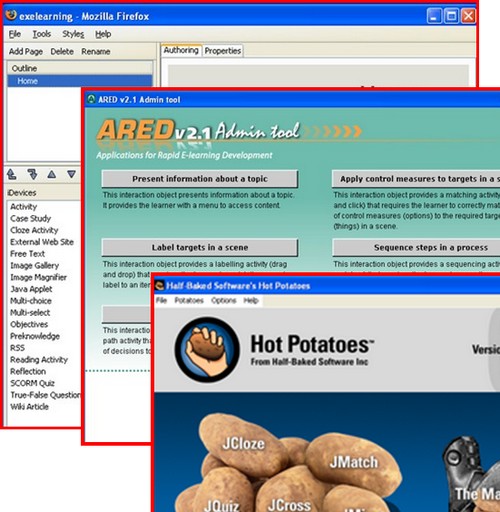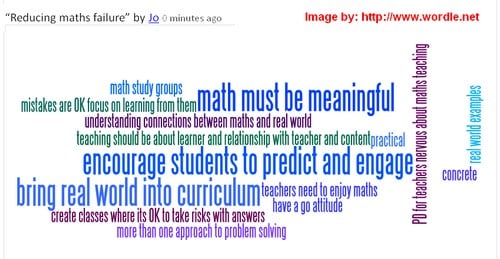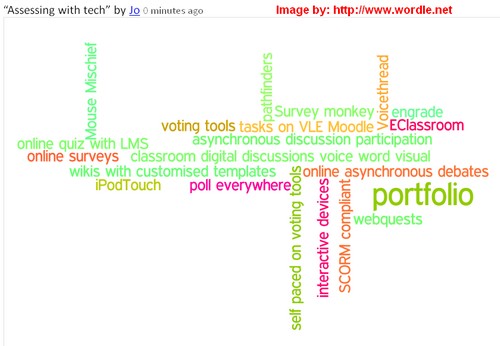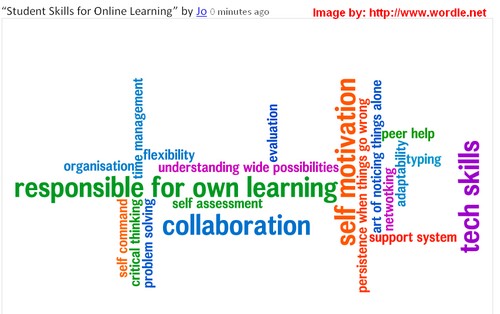Introduction
I was inspired to write this post when I read Shelly Terrell’s post “Bad Teachers, Scapegoats, and Halting Education Transformation” on the Cooperative Catalyst Blog. I think this is a “must read” post for all in education whatever their role. I added a short, and very hurried, comment to Shelly’s post but felt there was so much I wanted to say that putting it all in a comment would make the comment inappropriately large. So here goes with the post!
The focus of Shelly’s post is on the escalating “blame the teacher” culture in the USA, which she writes about so graphically and with great passion. It is also about the need for informed reform rather then the “knee jerk” reactions that appear to be taking place. I began a comment and realised that it was likely to become inordinately long so I cut it short with an appreciation of Shelly’s very apt analogy and a reference to my feeling that this is not just an issue within the USA but is global in scope. As a child growing up in the UK I remember much more respect for the role of teacher. Certainly from my perspective if I was in trouble at school I was also in trouble at home because my parents (neither of them highly educated) believed that my teachers were entitled to be treated with respect. This seems to have changed significantly with time, not just in the UK but also here in Australia and as I am very well aware through my PLN in the USA as well.
Context
By the time I became involved in teaching some 20 years after leaving school the whole focus was shifting strongly from the respect your teacher culture of my childhood towards disrespect for teachers and indeed for “authority figures” in general. My teaching was (and still is) in an adult education context albeit with many 15-19 year old learners and the culture of blame was becoming established in the UK then – just over 20 years ago! A colleague nearing retirement said something to me at the time that has stuck ever since – her words were “teachers are the only profession that is held responsible for the quality of others’ work without any authority over those people”. I am aware that the phrasing is not “of this time” however the idea is still valid. I put this out on Twitter once and got a reply that someone was responsible for the actions of their work team. In my view this misses the point as members of a work team are there because they want to be for some reason, even if this reason is the pay cheque at the end of the week. The work team manager also has “authority” in the form of organisational sanctions that may be applied if members don’t work appropriately.
Currently, teachers seem to be held ever more responsible when students don’t “learn” (learn often being quantified by level of achievement in standardised tests). However teachers also lack the freedom to make the professional, informed educational decisions that suit the needs of their students and increase the likelihood of engagement and subsequent learning. Teachers often also have large classes, including students with a wide range of behavioural and learning issues. In my personal experience of working with disengaged young people (having behavioural and other issues) in a mixed group with mature age learners, much time is often spent keeping everyone safe! There is often little or no parental support for the teacher if the young person behaves inappropriately towards others either verbally or physically. Opportunities for learning can be difficult to generate in that situation, especially when we are constrained by the required outcomes. I am lucky I don’t have to “get my students through” standardised tests, because our vocational general education (ie literacy/numeracy) curriculum is outcomes based. However they do have to generate products that meet the assessment criteria, which in itself is a challenge.
Why is education treated differently?
As a global society there seems to be an increasing emphasis on consulting all stakeholders about policy and practice relating to every facet of society. However this appears to be disregarded when it comes to consulting educators about the future of education. I have wondered about this intermittently for some time and to me there seem to be a few points that keep recurring in my thinking, these are in no particular order.
1. We are an increasingly litigious society – because of this there always has to be someone to blame. Teachers are a useful scapegoat. They are in the front line and may often be in second place to a parent as the person (other than peer group) with whom the students is perceived to spend the most time. Of course no-one wants to be aware that with a class of 30 students this time spent is 2 minutes per student per hour!
2. Anyone who has been a student feels that they are more qualified to speak on and make decisions on education policy and practice then someone who has made it their lifetime profession. This is analogous to someone who regularly attends court cases feeling that they are qualified to frame legislation and hand down legal judgements. Actually perhaps not a good analogy after all as this is what politicians do all the time, although I believe they do sometimes consult with the legal profession!
3. Using standardised tests on one group of people to judge the competence of another group is illogical. Standardised testing in general makes no sense to me for several reasons in addition to its dysfunction in measuring teacher competence:
- The (I believe) erroneous perception that learning (as opposed to memorising) can be easily judged by measuring (ie taking a test score). I’m not saying there is no place for memorising – I still bless the teacher who drilled me in “times tables” in primary school. However learning is more qualitative than quantitative, particularly as you move into higher order skills.
- One size fits all approach – we have the juxtaposition of “treat students as individuals” versus the “students should achieve this score at this age” strategy of standardised testing.
- Similar to the previous point – this score should be achieved in this time period no matter what baseline the student starts from. There is no consideration of “added value” ie how far has the student moved from their baseline
- Narrowing of curriculum – the result of standardised tests with restricted content is that teachers are pressured into teaching to the test not the needs of the student or even the curriculum. This is made worse by the fact the students (and often their parents) only want the work that will be in the test.
4. Many educators are willing and keen to demystify education by debating the effectiveness or otherwise of their strategies with people outside their profession. This very willingness to be open to discussion and reflection has sometimes given those who would criticise destructively greater opportunities to do so.
5. I wonder at times whether there is not an element of jealousy in the sometimes vituperative criticism aimed at teachers. There has always been a perception that “teachers have it easy”, arising from the apparently short days and long holidays. I remember being surprised on visiting the home of my English teacher when I was 12 at the piles of exercise books awaiting marking over the weekend. This teacher lent us his own books, put on a school play every year – and gave those of us who took part a party after the last performance. At least he didn’t suffer abuse and blame for the fact that most of my peers were actively discouraged from reading at home and did not read well. We were rural children and many were expected to contribute to feeding the family or looking after younger siblings, rather than “waste time” reading.
In conclusion
I feel that all of the above are factors that contribute to what makes (in my personal opinion) education different. The net result is that teachers are trapped between the proverbial “rock and a hard place”. The outcome is stressed, scared teachers. I think this is why some are joining the witch hunt. Like Shelly I am angry when teachers join the condemnation of their colleagues as “bad teachers” but I can see that they might feel (perhaps unrealistically) that this makes them personally more secure in their own jobs.
I also agree with Shelly that change has to happen and that it should be informed change with input from all stakeholders. I am unsure whether or when this will happen. However as Shelly indicates it seems possible that there is some re-evaluation happening in the UK with respect to judging teachers and schools on the basis of standardised tests. I think the USA is further down the road of standardised testing and subsequent blame than we are here in Australia and I fear that our politicians are treading the same path.
Thank you Shelly for providing the trigger for this!
 Our next Webinar is an Edublogs “Serendipity” session, one of our fortnightly unconference sessions where we invite you to bring along your “hot topics” and “burning issues” for our poll on the topic of the day. If you want to propose a topic in advance then visit the Serendipity Wallwisher and add your topic. Then join us on Thursday Oct 28th at 23:00 GMT/UTC (7pm USA EST, Midnight BST) or Friday Oct 29th at 1am CEST,7am West Aus, 10am NSW, depending on your timezone – in the usual Elluminate room
Our next Webinar is an Edublogs “Serendipity” session, one of our fortnightly unconference sessions where we invite you to bring along your “hot topics” and “burning issues” for our poll on the topic of the day. If you want to propose a topic in advance then visit the Serendipity Wallwisher and add your topic. Then join us on Thursday Oct 28th at 23:00 GMT/UTC (7pm USA EST, Midnight BST) or Friday Oct 29th at 1am CEST,7am West Aus, 10am NSW, depending on your timezone – in the usual Elluminate room







